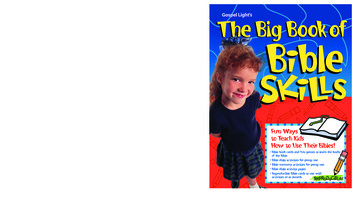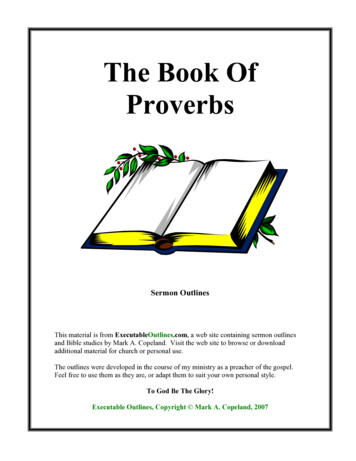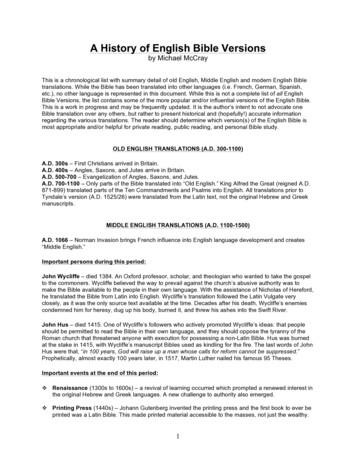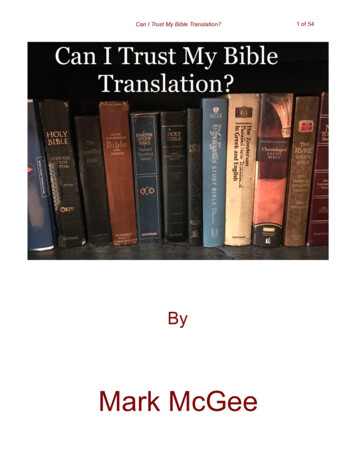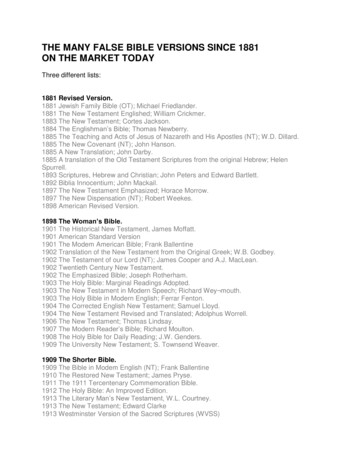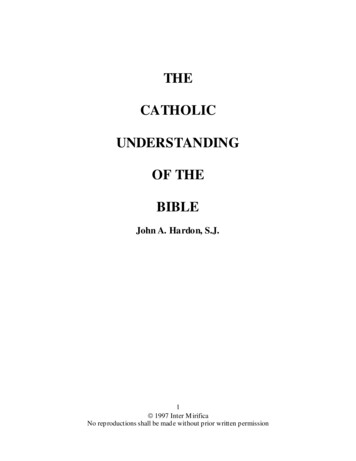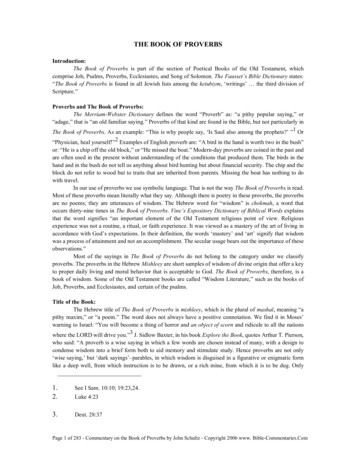
Transcription
THE BOOK OF PROVERBSIntroduction:The Book of Proverbs is part of the section of Poetical Books of the Old Testament, whichcomprise Job, Psalms, Proverbs, Ecclesiastes, and Song of Solomon. The Fausset’s Bible Dictionary states:“The Book of Proverbs is found in all Jewish lists among the ketubiym, ‘writings’ the third division ofScripture.”Proverbs and The Book of Proverbs:The Merriam-Webster Dictionary defines the word “Proverb” as: “a pithy popular saying,” or“adage,” that is “an old familiar saying.” Proverbs of that kind are found in the Bible, but not particularly inThe Book of Proverbs. As an example: “This is why people say, ‘Is Saul also among the prophets?’ ”1 Or“Physician, heal yourself!”2 Examples of English proverb are: “A bird in the hand is worth two in the bush”or: “He is a chip off the old block,” or “He missed the boat.” Modern-day proverbs are coined in the past andare often used in the present without understanding of the conditions that produced them. The birds in thehand and in the bush do not tell us anything about bird hunting but about financial security. The chip and theblock do not refer to wood but to traits that are inherited from parents. Missing the boat has nothing to dowith travel.In our use of proverbs we use symbolic language. That is not the way The Book of Proverbs is read.Most of these proverbs mean literally what they say. Although there is poetry in these proverbs, the proverbsare no poems; they are utterances of wisdom. The Hebrew word for “wisdom” is chokmah, a word thatoccurs thirty-nine times in The Book of Proverbs. Vine’s Expository Dictionary of Biblical Words explainsthat the word signifies “an important element of the Old Testament religious point of view. Religiousexperience was not a routine, a ritual, or faith experience. It was viewed as a mastery of the art of living inaccordance with God’s expectations. In their definition, the words ‘mastery’ and ‘art’ signify that wisdomwas a process of attainment and not an accomplishment. The secular usage bears out the importance of theseobservations.”Most of the sayings in The Book of Proverbs do not belong to the category under we classifyproverbs. The proverbs in the Hebrew Mishleey are short samples of wisdom of divine origin that offer a keyto proper daily living and moral behavior that is acceptable to God. The Book of Proverbs, therefore, is abook of wisdom. Some of the Old Testament books are called “Wisdom Literature,” such as the books ofJob, Proverbs, and Ecclesiastes, and certain of the psalms.Title of the Book:The Hebrew title of The Book of Proverbs is mishleey, which is the plural of mashal, meaning “apithy maxim,” or “a poem.” The word does not always have a positive connotation. We find it in Moses’warning to Israel: “You will become a thing of horror and an object of scorn and ridicule to all the nationswhere the LORD will drive you.”3 J. Sidlow Baxter, in his book Explore the Book, quotes Arthur T. Pierson,who said: “A proverb is a wise saying in which a few words are chosen instead of many, with a design tocondense wisdom into a brief form both to aid memory and stimulate study. Hence proverbs are not only‘wise saying,’ but ‘dark sayings’–parables, in which wisdom is disguised in a figurative or enigmatic formlike a deep well, from which instruction is to be drawn, or a rich mine, from which it is to be dug. Only1.2.See I Sam. 10:10; 19:23,24.3.Deut. 28:37Luke 4:23Page 1 of 283 - Commentary on the Book of Proverbs by John Schultz - Copyright 2006 www. Bible-Commentaries.Com
profound meditation will reveal what is hidden in these moral and spiritual maxims.” Derek Kidner, in hiscommentary Proverbs, part of The Tyndale Old Testament Commentaries, writes about the title: “The Heb.term (in the singular, mãsãl) basically means ‘a comparison’ (e.g. the sharp simile such as – at random –11:22; 12:4; or the full-grown allegory of Ezk. 17:2 ff.; cf. Jdg. 9:8 ff.), but it came to stand for any kind ofsage pronouncement, from a maxim or observation to a sermon (e.g. chapter 5), and from a wisecrack(Ezk. 18:2) to a doctrinal revelation (Ps. 49:4).”Author or Authors:The Book of Proverbs opens with the word: “The proverbs of Solomon son of David, king ofIsrael.” The International Standard Bible Encyclopaedia observes about this: “It seemed good to thecompilers, however, to repeat, or perhaps retain an older heading, ‘The proverbs of Solomon’ at chapter 10,as if in some special sense the collection there beginning deserved it; and at chapter 25 still another headingoccurs: ‘These also are proverbs of Solomon, which the men of Hezekiah king of Judah copied out.’ Allthese ascribe the proverbs to Solomon; but the heading (Prov 30:1), ‘The words of Agur the son of Jakeh;the oracle,’ and the heading (31:1), ‘The words of king Lemuel; the oracle which his mother taught him,’indicate that authorship other than that of Solomon is represented; while the mention of ‘the words of thewise’ (1:6; 22:17), as also the definite heading, ‘These also are sayings of the wise’ (24:23), ascribe parts ofthe book to the sages in general. The book is confessedly a series of compilations made at different times;confessedly, also, to a considerable extent at least, the work of a number, perhaps a whole guild, of writers.”The same Encyclopaedia adds: “That The Book of Proverbs is composed of several collections made atdifferent times is a fact that lies on the surface; as many as eight of these are clearly marked, and perhapssubdivisions might be made.” And: “The section Prov 10:1-22:16, with the repeated heading ‘The proverbsof Solomon,’ seems to have been the original nucleus of the whole collection.”The Book of First Kings makes mention of Solomon’s poetical talents as part of the wisdom Godhad given to him. We read: “God gave Solomon wisdom and very great insight, and a breadth ofunderstanding as measureless as the sand on the seashore. Solomon’s wisdom was greater than the wisdomof all the men of the East, and greater than all the wisdom of Egypt. He was wiser than any other man,including Ethan the Ezrahite — wiser than Heman, Calcol and Darda, the sons of Mahol. And his famespread to all the surrounding nations. He spoke three thousand proverbs and his songs numbered a thousandand five. He described plant life, from the cedar of Lebanon to the hyssop that grows out of walls. He alsotaught about animals and birds, reptiles and fish. Men of all nations came to listen to Solomon’s wisdom,sent by all the kings of the world, who had heard of his wisdom.”1 In this context the word “wisdom” seemsto have the connotation of “talent,” or “skill.”Ironically, or rather tragically, Solomon, the wisest of Israel’s kings, did not practice what hepreached. Toward the end of his life he lost sight of the fact that “The fear of the LORD is the beginning ofknowledge” and he became himself one of the “fools [who] despise wisdom and discipline.”The Message of The Book of Proverbs:Derek Kidner, in Proverbs, states that The Book of Proverbs “is not a portrait-album or a book ofmanners: it offers a key to life. The samples of behavior which it holds up to view are all assessed by onecriterion, which could be summed up in the question, ‘Is this wisdom or folly?’ This is a unifying approachto life, because it suits the most commonplace realms as fully as the most exalted. Wisdom leaves itssignature on anything well made or well judged, from an apt remark to the universe itself, from a shrewdpolicy (which springs from practical insight) to a noble action (which presupposes moral and spiritualdiscernment). In other words, it is equally at home in the realms of nature and art, of ethics and politics, tomention no others, and forms a single basis of judgment for them all.”1.I Kings 4:29-34Page 2 of 283 - Commentary on the Book of Proverbs by John Schultz - Copyright 2006 www. Bible-Commentaries.Com
It is appropriate to state that The Book of Proverbs is a book of judgment. It holds up the mirror tous to make us understand how much we have deviated from the course God has set for our lives. James’words could be seen as a commentary on The Book of Proverbs: “Do not merely listen to the word, and sodeceive yourselves. Do what it says. Anyone who listens to the word but does not do what it says is like aman who looks at his face in a mirror and, after looking at himself, goes away and immediately forgets whathe looks like. But the man who looks intently into the perfect law that gives freedom, and continues to dothis, not forgetting what he has heard, but doing it — he will be blessed in what he does.”1In his commentary The Proverbs, Kidner distinguishes eight different themes or subjects: “God andMan,” “Wisdom,” “The Fool,” “The Sluggard,” “The Friend,” “Words,” “The Family,” and “Life andDeath.”On the subject “God and Man,” Kidner observes: “When we open The Book of Proverbs at randomand take samples of its wisdom, we may gain the impression that its religious content is thin and indefinite.Many of its maxims and theological assertions would transplant into non-Israelite, non-biblical soil, and weare tempted to ask whether anything as specific as a covenant-relationship with God is presupposed here. Ahostile reader might go even further, and ask whether the real God and master in this book is not manhimself, and the real goal prosperity.” The author answers this: “To be sure, Proverbs is concerned to pointout that what is right and what pays may travel long distances together; but it leaves us in no doubt which weare to follow when their paths diverge. E.g., on the question of gifts and bribes, it will go as far as to say,without demur, ‘A gift opens the way for the giver and ushers him into the presence of the great,’(18:16)2; but it will not go a step further. ‘A wicked man,’ says 17:23, ‘accepts a bribe in secret to pervertthe course of justice’–and it is at once clear that justice, not success, is our proper concern, and that theunscrupulous will get no praise for their fancied wisdom. You have to be good to be wise–though Proverbsis particularly concerned to point out the converse: that you have to be wise to be really good; for goodnessand wisdom are not two separable qualities, but two aspects of a single whole. To take it further back, youhave to be godly to be wise; and this is not because godliness pays, but because the only wisdom by whichyou can handle everyday things in conformity with their nature is the wisdom by which they were divinelymade and ordered. That God is a reality to these writers is confirmed by their sense of sin–a shadow onlythrown by some sense of the divine. ‘Who can say, ‘ ‘I have kept my heart pure; I am clean and without sin’‘? (20:9). In Proverbs this is not the servile uneasiness that the Gentile felt. Sin must be put away inpractical repentance. While all go to God’s school, few learn wisdom there, for the knowledge which Heaims to instill is the knowledge of Himself; and this, too, is the ultimate prize. In submission to His authorityand majesty (that is, in the fear of the Lord) we alone start and continue our education; and by the diligentsearch for wisdom ‘as for hid treasures’ we shall find our prize in a growing intimacy with the same Lord.He is the beginning; He is also the end; for the goal is: ‘Then you will understand the fear of the LORD andfind the knowledge of God’ (2:5).”On the subject of wisdom, Kidner explores “The many facets of wisdom,” which he divides intofive sections. We read: “The Book of Proverbs opens by breaking up the plain daylight of wisdom into itsrainbow of constituent colors. These all shade into one another, and any one of them can be used to representthe whole; yet there is some value in seeing them momentarily analyzed and grouped.1. Instruction, or training a far from static term, is the first synonym, giving notice that wisdomwill be hard-won, a quality of character as much as of mind, sternness, ranging from warning (e.g. 24:32) tochastening. Its frequent companion is correction, or reproof, a noun whose derivation emphasizes verbalrather than physical persuasion: and appeal to reason and conscience. The two terms together can besummed up as discipline; they give the reminder that wisdom is not to be had through extra-mural study: it isfor disciples only.1.2.James 1:22-25I took the liberty to substitute Kidner’s quotations from the KJV with the texts of the NIV.Page 3 of 283 - Commentary on the Book of Proverbs by John Schultz - Copyright 2006 www. Bible-Commentaries.Com
2. The second synonym in Proverbs 1 is understanding, or insight The background idea (thoughit is not always prominent) can be gauged from the fact that the verb ‘to discern’ is parent to both nouns, andthe proposition ‘between’ is a near relation. Solomon put the two together in 1 Kings 3:9: ‘to distinguishbetween right and wrong’ (Cf. Phil. 1:9,10; Heb. 5:14). Another word ( ‘heart,’ i.e. ‘mind’) is alsorendered ‘understanding’ in AV and RV, but is better called sense, as in RSV: e.g. 6:32; 10:13; cf. Ho.7:11.”3. The third is wise dealing1 i.e. good sense, practical wisdom, savoir-faire. Its particularcharacter shows in its verb-form, which often means ‘be successful.’ Eve, in the garden, misconceived it assophistication (Gn. 3:6), but Abigail finely displayed it in her handling of a crisis (1 Sa. 25:3). Its supremeexpression (giving the lie to Eve) is in the unworldly triumph of the Servant of the Lord: Isaiah 52:13. At itsfirst appearance in Proverbs it is claimed for the right master by being coupled with ‘righteousness,judgment and equity’ (1:3b).2 A companion term is sound wisdom.4. In the same range lie the expressions shrewdness3 ( 1:4a) and discretion ( 1:4b) – the formerof these seen in enemy hands in Genesis 3:1, and the latter (which means, in C. H. Toy’s words, ‘the powerof forming plans’) so often degenerating into mere scheming that it can be used by itself in a bad sense (e.g.12:2) more often than in a good. But these qualities need not be corrupt, and the book is largely concerned toshow that the godly man is in the best sense a man of affairs, who takes the trouble to know his way about,and plan his course realistically (cf. 22:3: ‘a shrewd man sees danger and hides himself; but the simple goon, and suffer for it’). To use the literal meaning of counsels ( 1:5),4 he knows the ropes.5. A fifth group consists of the words knowledge and learning ( 1:5)5; the former not so muchan informed mind as a knowing of truth and indeed of God Himself (2:5; 3:6), and the latter tending toemphasize that doctrine is something given and received, or grasped.”The Nelson’s Illustrated Bible Dictionary warns: “In reading The Book of Proverbs, we need tomake sure we do not turn these wise sayings into literal promises. Proverbs are statements of the way thingsgenerally turn out in God’s world. For example, it is generally true that those who keep God’scommandments will enjoy ‘length of days and long life’ (3:2). But this should not be interpreted as anironclad guarantee. It is important to keep God’s laws, no matter how long or short our earthly life may be.Outline of The Book of Proverbs:Nelson’s Illustrated Bible Dictionary gives us the following outline of the book:I.II.The Purpose of ProverbsProverbs to the YouthA.Obey ParentsB.Avoid Bad CompanyC.Seek WisdomD.Benefits of WisdomE.Be Kind to OthersF.Security in WisdomG.Avoid the 3:27-354:1-134:14-221.NIV: “prudent life.”2.NIV: doing what is right and just and fair.3.NIV: prudence.4.NIV: guidance.5.In a footnote the author adds: “The word leqah is derived from the verb ‘to take’; hence it can alsomean in some contexts ‘persuasiveness,’ as in 7:21a; 16:21,23; cf. our expression: ‘very taking.’ ”Page 4 of 283 - Commentary on the Book of Proverbs by John Schultz - Copyright 2006 www. Bible-Commentaries.Com
III.IV.V.VI.H.Keep Your HeartI.Do Not Commit AdulteryJ.Be Faithful to Your SpouseK.Avoid SuretyL.Do Not Be LazyM.Do Not Commit AdulteryN.Praise of WisdomO.Avoid FollyProverbs of SolomonA. Proverbs Contrasting the Godly and the WickedB. Proverbs Encouraging Godly LivesC. Proverbs Concerning Various SituationsProverbs of Solomon Copied by Hezekiah’s MenA. Proverbs Regulating Relationships with Others1. Relationships with Kings2. Relationships with Neighbors3. Relationships with Enemies4. Relationships with Yourself5. Relationships with Fools6. Relationships with Sluggards7. Relationships with GossipsB. Proverbs Regulating Various ActivitiesThe Words of AgurThe Words of King LemuelA. Wisdom for LeadersB. Wise 7303131:1-931:10-31Analysis:I. The Purpose of Proverbs1:1-7The proverbs of Solomon son of David, king of Israel:2 for attaining wisdom and discipline; for understanding words of insight;3 for acquiring a disciplined and prudent life, doing what is right and just and fair;4 for giving prudence to the simple, knowledge and discretion to the young —5 let the wise listen and add to their learning and let the discerning get guidance —6 for understanding proverbs and parables, the sayings and riddles of the wise.7 The fear of the LORD is the beginning of knowledge, but fools despise wisdom and discipline.The Commentary Geneva Notes introduces The Book of Proverbs with: “The wonderful love ofGod toward his Church is declared in this book: for as much as the sum and effect of the whole Scriptures ishere set forth in these brief sentences, which partly contain doctrine, and partly manners, and alsoexhortations to both: of which the first nine chapters are as a preface full of grave sentences and deepmysteries, to assure the hearts of men to the diligent reading of the parables that follow: which are left as aprecious jewel to the Church, of those three thousand parables mentioned in 1 Kings 4:32 and were gatheredand committed to writing by Solomon’s servants and incited by him.”It is obvious that wisdom did not begin and end with Solomon. The Book of Job demonstrates thatan appreciation for wisdom and a thirst for understanding the mysteries of life existed long before Solomonwas born. Archeological finds testify to the fact that the Babylonians were far ahead of their time in theircomprehension of the universe. We still honor them in the division of our day in 24 hours of 60 minutes,Page 5 of 283 - Commentary on the Book of Proverbs by John Schultz - Copyright 2006 www. Bible-Commentaries.Com
divided into 60 seconds per minute. Also the fact that the rumor about Solomon’s wisdom spread toneighboring nations is an indication of the fact that wisdom was valued. Derek Kidner, in Proverbs, states:“The rapid spread of Solomon’s reputation, and the flocking of foreign visitors to hear him (I Ki. 4:34; 10:113, 24), illustrate the intellectual climate of the time both outside and within Israel. It was a common thingfor sages to visit foreign courts and test each other’s wit and wisdom.”Wisdom was God’s coronation gift to Solomon. We read that Solomon had a dream in which Godasked him what he wanted as he ascended the throne of Israel. Solomon answered: “I am only a little childand do not know how to carry out my duties. Your servant is here among the people you have chosen, a greatpeople, too numerous to count or number. So give your servant a discerning heart to govern your people andto distinguish between right and wrong. For who is able to govern this great people of yours?” We read thatGod was pleased with Solomon’s request and answered him: “Since you have asked for this and not for longlife or wealth for yourself, nor have asked for the death of your enemies but for discernment in administeringjustice, I will do what you have asked. I will give you a wise and discerning heart, so that there will neverhave been anyone like you, nor will there ever be. Moreover, I will give you what you have not asked for —both riches and honor — so that in your lifetime you will have no equal among kings. And if you walk inmy ways and obey my statutes and commands as David your father did, I will give you a long life. ThenSolomon awoke — and he realized it had been a dream.” 1It must be stated that only wise people ask for wisdom. It takes intelligence and insight to knowwhat our real needs are. Very few people, if any, face the challenges Solomon faced as he became king ofIsrael, but we must all chart our way through life and the realization of the cliffs that must be avoided andthe snares that must be escaped ought to make us voice a request similar to Solomon’s. God is willing toshare with us a wisdom of which Solomon’s was a mere shadow. In the words of the Apostle Paul: “It isbecause of him that you are in Christ Jesus, who has become for us wisdom from God — that is, ourrighteousness, holiness and redemption.”2 And Jesus testified about Himself: “One greater than Solomon ishere.”3We do well, when reading The Book of Proverbs, to keep in mind the connection between thewisdom King Solomon of old shares with us and the One who is our wisdom from God, our Savior JesusChrist. Wisdom in the life of a child of God begins with redemption and expresses itself in holiness andrighteousness.There are several Hebrew words in the opening verses of The Book of Proverbs that demand ourspecial attention if we want to understand what God is saying to us. The proverbs are given to us “forattaining wisdom and discipline; for understanding words of insight; for acquiring a disciplined and prudentlife, doing what is right and just and fair; for giving prudence to the simple, knowledge and discretion.”The first word is chokmah, which is the common word for “wisdom,” or “skill.” Living the life Godintends for us to live requires skill. We live in a dangerous world in which some spiritual powers are out todestroy us. Jesus says: “The thief comes only to steal and kill and destroy; I have come that they may havelife, and have it to the full.”4 The Greek word rendered “to the full” is perissos, which has the meaning ofbeing “superabundant” or “superior.” God does not want us to float through life aimlessly and merely existor vegetate; He has destined us to live existentially and eternally, life on the highest plane.The second Hebrew word, rendered “discipline” is muwcar, which conveys the idea of “restraint”and even “chastisement.” The Apostle Paul compares the Christian life with an athletic achievement. We areto live like participants in the Olympics. He wrote to the Corinthians: “I beat my body and make it my slave1.2.3.4.See I Kings 3:4-15.I Cor. 1:30Matt. 12:42John 10:10Page 6 of 283 - Commentary on the Book of Proverbs by John Schultz - Copyright 2006 www. Bible-Commentaries.Com
so that after I have preached to others, I myself will not be disqualified for the prize.”1 And to the church inThessalonica: “It is God’s will that you should be sanctified: that you should avoid sexual immorality; thateach of you should learn to control his own body in a way that is holy and honorable. For God did not call usto be impure, but to live a holy life.”2 God expects us to use self-discipline to get in shape and if we do notpractice that discipline, He is willing to impose it upon us by way of chastisement. The author of the Epistleto the Hebrews elaborates on this: “In your struggle against sin, you have not yet resisted to the point ofshedding your blood. And you have forgotten that word of encouragement that addresses you as sons: ‘Myson, do not make light of the Lord’s discipline, and do not lose heart when he rebukes you, because the Lorddisciplines those he loves, and he punishes everyone he accepts as a son.’ Endure hardship as discipline;God is treating you as sons. For what son is not disciplined by his father? If you are not disciplined (andeveryone undergoes discipline), then you are illegitimate children and not true sons. Moreover, we have allhad human fathers who disciplined us and we respected them for it. How much more should we submit tothe Father of our spirits and live! Our fathers disciplined us for a little while as they thought best; but Goddisciplines us for our good, that we may share in his holiness. No discipline seems pleasant at the time, butpainful. Later on, however, it produces a harvest of righteousness and peace for those who have been trainedby it.”3 God’s goal with our life is that we may share in His holiness, that is that we may inherit His glory. Inhis book The Problem of Pain, C. S. Lewis writes: “God whispers to us in our pleasures, He speaks to us inour circumstances, but He shouts to us in our pain.”The third word is biynah, meaning, “perfect understanding.” How practical this is, is clear from theverse, in which the same word is used, which speaks of “the men of Issachar, who understood the times andknew what Israel should do.”4The fourth word sakal refers to the kind of wisdom that makes one successful. We find it in theverse: “Whatever Saul sent him to do, David did it so successfully that Saul gave him a high rank in thearmy.”5The fifth word, “doing what is right” is the translation of one single Hebrew word tsedeq, rendered“justice” in the King James Version. It carries the meaning of that which is naturally, morally or legallyright. There is also a notion of prosperity in it. In the Old Testament “prosperity” covered more than materialadvantage. The material aspect was an expression of a spiritual condition. In Leviticus the word is used inconnection with court cases as in the verse: “Do not pervert justice; do not show partiality to the poor orfavoritism to the great, but judge your neighbor fairly.”6 In the context of business we read: “Your scalesand weights must be accurate. Your containers for measuring dry goods or liquids must be accurate. I, theLORD, am your God, who brought you out of the land of Egypt.”7“Just and fair” is the rendering of the words mishpat and meyshar, meaning “a verdict,” coveringthe whole legal process, including the act, the place, the suit, the crime, and the penalty, and a participant’sright or privilege, and “straightness, or “rectitude.” As we can see some words overlap each other inmeaning.All this is for the purpose of “giving prudence to the simple,” and “knowledge and discretion to theyoung.” “The simple,” pethiy in Hebrew, is someone who, according to a footnote in the NIV, is “without1.2.3.4.5.6.7.I Cor. 9:27I Thess. 4:3,4,7Heb. 12:4-11I Chron. 12:32I Sam. 18:5Lev. 19:15Lev. 19:36 (New Living Translation)Page 7 of 283 - Commentary on the Book of Proverbs by John Schultz - Copyright 2006 www. Bible-Commentaries.Com
moral direction and inclined to evil.” The word occurs at least thirteen times in The Book of Proverbs. Theword “prudence” ormah in Hebrew, is a synonym for wisdom, but it has the added meaning of “subtlety.”Jesus used the New Testament equivalent when He said to His disciples: “I am sending you out like sheepamong wolves. Therefore be as shrewd as snakes and as innocent as doves.”1The “knowledge,” da ath, a young man is to acquire, is the skill needed to live according to the willof God. The word is used in connection with the skill of craftsmanship, as in the verses: “See, I have chosenBezalel son of Uri, the son of Hur, of the tribe of Judah, and I have filled him with the Spirit of God, withskill, ability and knowledge in all kinds of crafts — to make artistic designs for work in gold, silver andbronze, to cut and set stones, to work in wood, and to engage in all kinds of craftsmanship.”2The last word is mezimmah, which means “a plan.” In this context it has obviously a positiveconnotation, but it can also mean an evil plot as in Job’s answer to his friends: “I know full well what youare thinking, the schemes by which you would wrong me.”3The wisdom of Proverbs is not only for the young and inexperienced but also for those who havetraveled the road for years and have gained considerable experience. The Jamieson, Fausset, and BrownCommentary observes: “True wisdom is never stationary, but always progressive; because it secures theground behind it as a basis for further advances.” The “discerning” are those who use their judgment “toseparate mentally” between what is right and wrong, between what is better and best. Joseph advisedPharaoh to “look for a discerning and wise man and put him in charge of the land of Egypt.”4 And Pharaohunderstood immediately that someone who gave such advice qualified to be that man. The wise man is theone who understand that he has to use a compass to correct his course in life from time to time. That is themeaning of the Hebrew word tachbulah, which the KJV renders “wise counsel” and the NIV “guidance.” Itis a word that refers to the steering of a ship. The Pulpit Commentary states: “The principle here enunciatedis again stated in Proverbs 9:9, ‘Give instruction to a wise man, and he will be yet wiser,’ and findsexpression under the gospel economy in the words of our Lord, ‘For whosoever hath, to him shall be given,and he shall have more abundance.’ ”5The material to be learned is described as “proverbs and parables, sayings and riddles.” TheHebrew word for riddle is chiydah, which has thrown many Bible scholars for a loop. We find it in therebuke God gave to Aaron and Miriam when they opposed Moses’ leadership and God defended him: “Withhim I speak face to face, clearly and not in riddles; he sees the form of the LORD. Why then were you notafraid to speak against my servant Moses?”6 It is used for the riddle Samson gave to solve to the Philistineson his wedding feast.7 And Habakkuk prophesied: “Will not all of them taunt him with ridicule and scorn,saying, ‘Woe to him who piles up stolen goods and makes himself wealthy by extortion! How long must thisgo on?’ ”8 The KJV uses the words “a taunting proverb.”The use of
The International Standard Bible Encyclopaedia observes about this: “It seemed good to the compilers, however, to repeat, or perhaps retain an older heading, ‘The proverbs of Solomon’ at chapter 10, as if in some special sense the collection there begin

